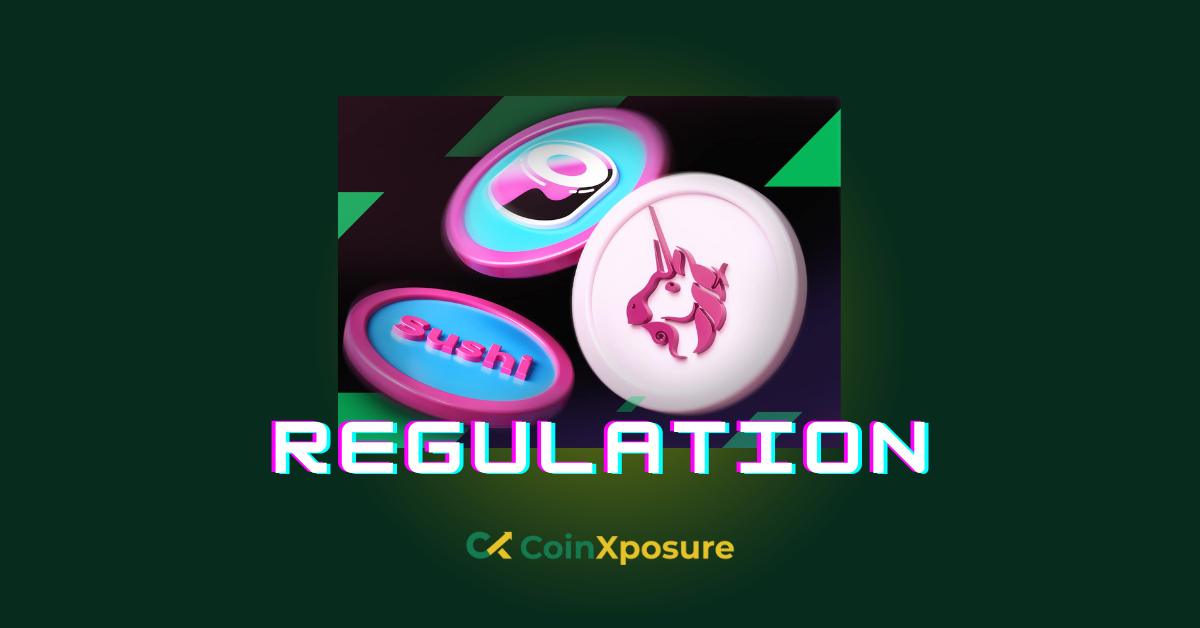
Regulation and Compliance in the World of Decentralized Exchanges
Decentralized exchanges (DEXs) have emerged as innovative platforms that allow users to trade cryptocurrencies directly without the need for intermediaries.
While offering numerous benefits such as increased security and privacy, DEXs also present unique challenges in terms of regulation and compliance.
In this rapidly evolving landscape, navigating regulatory requirements is essential to ensure the legitimacy and sustainability of decentralized trading platforms. This article provides an overview of the regulatory and compliance considerations shaping the world of decentralized exchanges.
How Decentralized Exchanges (DEXs) Work
Decentralized exchanges (DEXs) operate on blockchain technology and enable peer-to-peer trading of digital assets without the need for intermediaries like centralized exchanges. Here’s how they work:
- Smart Contracts
- Order Books
- Asset Custody
- Decentralized Governance
- Integration with Wallets
Smart Contracts
DEXs utilize smart contracts, which are self-executing contracts with the terms of the agreement directly written into code. These smart contracts automate the trading process, eliminating the need for a centralized authority to facilitate transactions.
Order Books
Instead of a centralized order book maintained by an exchange, DEXs use decentralized order books. These order books are stored on the blockchain and are accessible to all participants, ensuring transparency and preventing manipulation.
Asset Custody
In DEXs, users retain control of their assets at all times. They do not need to deposit funds into the exchange’s wallet. Instead, trades occur directly between users’ wallets using cryptographic techniques like atomic swaps or proxy tokens.
Decentralized Governance
Some DEXs implement decentralized governance mechanisms, where token holders have voting rights to make decisions about platform upgrades, fee structures, and other governance matters.
Integration with Wallets
Users interact with DEXs through compatible cryptocurrency wallets that support decentralized trading. These wallets often integrate with DEX interfaces, allowing users to place buy or sell orders directly from their wallets.
DEXs provide a trustless and censorship-resistant way to trade cryptocurrencies while offering users greater control over their funds and privacy.
Importance of Regulation and Compliance in DEXs
Regulation and compliance are crucial in the world of decentralized exchanges (DEXs) for several reasons:
- Investor Protection
- Market Integrity
- Legal Clarity
- Risk Management
Investor Protection
Regulations help protect investors from fraud, scams, and market manipulation by establishing standards for transparency, security, and disclosure. Compliance measures such as anti-money laundering (AML) and know-your-customer (KYC) requirements can help verify the identities of users and mitigate illicit activities.
Market Integrity
Regulatory oversight promotes market integrity by ensuring fair and orderly trading practices. Rules governing DEXs can help prevent insider trading, market manipulation, and other abusive practices, fostering trust and confidence among participants.
Legal Clarity
Clear regulatory frameworks provide legal clarity for DEX operators and users, reducing uncertainty and the risk of enforcement actions. Compliance with applicable laws and regulations also helps DEXs avoid legal liabilities and penalties.
Risk Management
Regulatory requirements can help DEXs implement effective risk management practices, including cybersecurity measures, asset custody standards, and dispute resolution mechanisms. Compliance with industry best practices can enhance the resilience and stability of DEX platforms.
Regulation and compliance play a crucial role in promoting the long-term sustainability, legitimacy, and adoption of decentralized exchanges in the global financial ecosystem.
Regulatory Challenges of Decentralized Exchanges (DEXs)
Decentralized exchanges (DEXs) face several regulatory challenges due to their unique characteristics and the evolving regulatory landscape:
- Lack of Centralized Control
- Jurisdictional Complexity
- AML/KYC Compliance
- Regulatory Uncertainty
- Technology Risks
- Market Manipulation
Lack of Centralized Control
Traditional regulatory frameworks are often designed for centralized entities, making it challenging to apply them to decentralized systems where there is no central authority or operator to regulate.
This lack of centralized control complicates enforcement efforts and raises questions about liability and accountability.
Jurisdictional Complexity
DEXs operate on a global scale, and their decentralized nature can make it difficult to determine the jurisdiction under which they fall. Regulatory requirements vary significantly from one jurisdiction to another, creating compliance challenges and potential conflicts of law for DEX operators and users.
AML/KYC Compliance
Anti-money laundering (AML) and know-your-customer (KYC) regulations are fundamental requirements for financial institutions to prevent illicit activities such as money laundering and terrorist financing.
However, implementing AML/KYC measures in a decentralized environment without compromising user privacy presents technical and legal challenges for DEXs.
Regulatory Uncertainty
The regulatory status of DEXs remains uncertain in many jurisdictions, with regulators grappling to adapt existing regulations or develop new frameworks to address the unique characteristics of decentralized trading platforms.
This regulatory uncertainty hampers industry growth and innovation, as stakeholders navigate legal risks and compliance burdens.
Technology Risks
DEXs rely on blockchain technology and smart contracts, which introduce unique technical risks such as vulnerabilities in smart contract code, security breaches, and operational disruptions. Regulators may lack the expertise to assess and address these technology risks effectively, further complicating regulatory oversight.
Market Manipulation
The decentralized nature of DEXs may facilitate market manipulation tactics such as front-running, wash trading, and spoofing.
Regulators face challenges in detecting and preventing market manipulation in decentralized markets where trading activities are conducted directly between users without centralized surveillance mechanisms.
Addressing these regulatory challenges requires collaboration between regulators, industry stakeholders, and technology experts to develop appropriate regulatory frameworks that balance innovation with investor protection, market integrity, and financial stability.
Current Regulatory Approaches of DEXs
Current regulatory approaches to decentralized exchanges (DEXs) vary across jurisdictions and are evolving rapidly as regulators grapple with the unique challenges posed by decentralized trading platforms. Here are some key regulatory approaches being taken:
- Adaptation of Existing Regulations
- Regulatory Guidance and Statements
- Enforcement Actions
- Industry Engagement and Self-Regulation
- Jurisdictional Arbitrage
- International Cooperation
Adaptation of Existing Regulations
Some jurisdictions are seeking to adapt existing regulatory frameworks designed for centralized exchanges to apply to DEXs.
This approach involves interpreting existing laws and regulations, such as securities laws, anti-money laundering (AML) regulations, and know your customer (KYC) requirements, to encompass decentralized trading activities.
Regulatory Guidance and Statements
Regulators in several jurisdictions have issued guidance documents and public statements to provide clarity on the regulatory treatment of DEXs. These guidance documents may outline regulatory expectations, compliance requirements, and potential legal risks for DEX operators and users.
Enforcement Actions
In cases where DEXs are found to be operating in violation of applicable laws and regulations, regulators may take enforcement actions to protect investors and uphold market integrity.
These actions may include fines, cease-and-desist orders, and legal proceedings against DEX operators or individuals involved in illegal activities.
Industry Engagement and Self-Regulation
Some DEX projects and industry associations are proactively engaging with regulators to develop self-regulatory initiatives and best practices for the decentralized exchange sector. These efforts aim to promote compliance, transparency, and responsible governance within the DEX ecosystem.
Jurisdictional Arbitrage
Due to regulatory fragmentation and uncertainty, some DEX operators and users may engage in jurisdictional arbitrage by relocating to jurisdictions with more favorable regulatory environments or regulatory arbitrage by designing DEX platforms to avoid regulatory scrutiny.
International Cooperation
Given the global nature of DEXs, there is increasing recognition of the need for international cooperation and coordination among regulators to address cross-border regulatory challenges effectively.
Initiatives such as information sharing, regulatory sandboxes, and multilateral agreements may facilitate collaboration among regulators.
Regulatory approaches to DEXs are still evolving, and there is a need for regulators to strike a balance between fostering innovation and ensuring investor protection, market integrity, and regulatory compliance in the decentralized exchange sector.
Compliance Measures for DEXs
Compliance measures for decentralized exchanges (DEXs) are essential to address regulatory requirements and ensure the legitimacy, security, and stability of these platforms. Here are some key compliance measures for DEXs:
- Anti-Money Laundering (AML) and Know Your Customer (KYC) Procedures
- Decentralized Identity Solutions
- Smart Contract Auditing
- Transaction Monitoring and Reporting
- Asset Custody and Security
- Compliance Documentation and Record-Keeping
Anti-Money Laundering (AML) and Know Your Customer (KYC) Procedures
Implementing robust AML and KYC procedures is crucial for DEXs to prevent illicit activities such as money laundering, terrorist financing, and fraud.
DEX operators can integrate identity verification processes, transaction monitoring systems, and risk-based customer due diligence measures to comply with AML/KYC regulations.
Decentralized Identity Solutions
Leveraging decentralized identity solutions can help DEXs authenticate users’ identities and verify their credentials without compromising privacy.
Technologies such as decentralized identifiers (DIDs), verifiable credentials, and zero-knowledge proofs enable users to control their identity information while complying with regulatory requirements.
Smart Contract Auditing
Conducting regular audits of smart contracts used in DEXs is essential to identify and mitigate security vulnerabilities, coding errors, and potential risks. Independent smart contract auditors can assess the integrity, reliability, and compliance of DEX smart contracts with regulatory standards and industry best practices.
Transaction Monitoring and Reporting
Implementing transaction monitoring systems allows DEXs to detect suspicious activities, unusual patterns, and potential risks in real-time.
DEX operators can establish reporting mechanisms to notify regulators of suspicious transactions, comply with regulatory reporting obligations, and facilitate investigations into illicit activities.
Asset Custody and Security
Ensuring the security and custody of users’ assets is paramount for DEXs to protect against theft, hacking, and operational risks.
DEX operators can implement multi-signature wallets, cold storage solutions, insurance coverage, and security best practices to safeguard users’ funds and mitigate security vulnerabilities.
Compliance Documentation and Record-Keeping
Maintaining comprehensive documentation and records of compliance activities, regulatory communications, and user interactions is essential for DEXs to demonstrate regulatory compliance, accountability, and transparency.
DEX operators should retain records of AML/KYC checks, transaction histories, audit reports, and regulatory correspondence.
By implementing these compliance measures, DEXs can enhance their regulatory readiness, mitigate legal risks, build trust with users and regulators, and foster the long-term sustainability of decentralized trading platforms in the global financial ecosystem.
Conclusion
Regulation and compliance are pivotal aspects in the world of decentralized exchanges (DEXs) to ensure the legitimacy, security, and stability of these innovative platforms.
Despite facing unique challenges such as the lack of centralized control, jurisdictional complexity, and regulatory uncertainty, DEXs must navigate the evolving regulatory landscape to foster industry growth and innovation while safeguarding investor protection and market integrity.
DEX operators and stakeholders must prioritize compliance measures such as anti-money laundering (AML) and know-your-customer (KYC) procedures, decentralized identity solutions, smart contract auditing, transaction monitoring, asset custody, and compliance documentation.
By adhering to regulatory requirements, DEXs can enhance their regulatory readiness, mitigate legal risks, and build trust with users, investors, and regulators.
Furthermore, international cooperation, industry engagement, and technological advancements in regulatory technology (RegTech) can facilitate the development of effective regulatory frameworks and compliance solutions for DEXs.
By striking a balance between fostering innovation and ensuring regulatory compliance, DEXs can contribute to the evolution of decentralized finance (DeFi) markets and the broader adoption of blockchain technology in the global financial ecosystem.
In this rapidly evolving landscape, collaboration among regulators, industry stakeholders, and technology experts is essential to address regulatory challenges, promote responsible innovation, and achieve the shared goals of investor protection, market integrity, and financial inclusion in the decentralized exchange sector.
Through collective efforts, DEXs can contribute to building a more transparent, secure, and accessible financial system for all.





